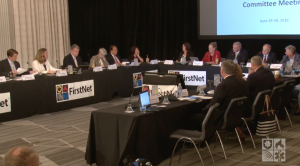Illinois Emergency Mgt. Agency receives $14 million toward radio updates
By Jean Lotus, Staff Reporter — August 29, 2016
The First Responder Network Authority (FirstNet) board met in Chicago June 30. FirstNet awarded the Illinois Emergency Management Agency $14 million in advance of the rollout of a national public safety communications network. (Courtesy: FirstNet website)
It took many years, but recommendations made by the federal 9-11 Commission to help police and fire personnel communicate more smoothly are finally moving in Illinois. The Illinois Emergency Management Agency announced Aug. 24 that they received a $14 million grant from the federal First Responder Network Authority (FirstNet) to help clear radio space for a digital national public safety radio network.
The Band 14 Incumbent Spectrum Relocation Grant Program will help local Illinois police and fire departments move their dispatch radio signals from the Band 14 radio spectrum, formerly used by many analog television broadcasters.
“Channels 62 and 63 of the analog television spectrum were allocated for first responders in Illinois,” said Joe Galvin, statewide interoperability coordinator of the IEMA. “FirstNet is awarding money so we can replace the radio equipment with something new that works on a different spectrum,” Galvin said. Emergency agencies in seven other states also received awards totaling $26.8 million.
Being able to communicate across agencies with other emergency personnel is a need that became evident during the 2001 9-11 attacks in New York City and Washington DC. , Galvin said. Police and fire agencies were on different radio frequencies. The FirstNet project, initiated in 2012, will build a nationwide digital LTE network– “think a super cell phone dedicated to public safety,” Galvin said — that can be used by local police and fire departments, or can be used to communicate with state or even national agencies.
Currently most Illinois emergency radio communication is delivered by the STARCOM21 network, which includes both walkie-talkie style programmable radios and other more expensive single-signal machines.
In the next year, IMEA will replace more than 1,000 vehicular repeater systems, which are emergency vehicle radios with signals up to 10 watts. The program will also replace 1,000 hand-held radios and will pay to reprogram 4,500 more. That’s about 10 percent of Illinois’s 47,000 emergency radios, Galvin said. There are around 700 municipal police and fire departments in the state of Illinois, as well as emergency departments for colleges and universities and water reclamation districts.
Improvements in radio technology and digitizing the signal has made police work safer, said Riverside Police Chief Tom Weitzel.
“The new digital system is very clear,” Weitzel said. “When you go inside a mall or large buildings, it used to be that [five-watt] police radio signals would never make it past the walls and concrete. Now you can be in the basement and an officer can still broadcast out, which is a huge safety issue.”
But along with advances in digital technology comes the encryption of emergency radio signals, removing police patrol radio dispatches from the public airwaves. The FirstNet program will be a completely digital signal, so no scanners will be able to pick it up.
“There’s a lot of debate on whether routine patrol [radio signals] should be encrypted,” Weitzel said. “I’m probably one of the only police chiefs who will say I’m in favor of having the patrol operation over an open radio signal.”
Weitzel admits this is a theoretical issue for Riverside, because the department uses the Cook County Sheriff’s encrypted frequencies. “The radios came that way,” he explained.
“I believe that special operations, undercover operations and narcotics should be encrypted,” Weitzel said. “But normal everyday operations should be available to the general public. Anytime law enforcement is trying to hide from the general public it’s a bad idea. There’s value in your residents being able to hear the amount of activity going on in your community.”
Police and fire departments in Illinois are struggling to do more with less money. A new state law passed this year mandates that smaller local police and fire agencies consolidate with their neighbors, and that is causing some friction between chiefs and dispatchers, Weitzel said.
“We decided to get ahead of [the new law] and meet with the [neighboring] police and fire chiefs and village managers and figure out an agreement in advance,” he said. In Riverside’s case, they’ll be using dispatchers who are Riverside employees who will work alongside Brookfield and North Riverside dispatchers at a call center in North Riverside. North Riverside will be the temporary booking and prisoner site as well, Weitzel said. Local Cook County suburban fire departments and emergency personnel currently have mutual-aid agreements through the Mutual Aid Box Alarm System (MABAS) which coordinates local fire departments for emergencies.
Adding to the financial crunch, public safety radios are expensive, between $5-$7,000 each, and small departments often find it hard to budget for replacement radios and system upgrades, often leasing systems. The FirstNet system will use $6.5 billion in federal dollars allocated in the 2012 federal Middle Class Tax Relief and Job Creation Act to develop a private-public nationwide system that hasn’t even been designed yet. For now, Galvin said, FirstNet just wants to help local state agencies clear the bandwidth frequencies before the roll-out in late 2017-18. The FirstNet board had one of its first meetings in Chicago in late June.
“FirstNet is still only on paper, it doesn’t exist yet,” Galvin said.
“I think the STARCOMM walkie-talkies are still going to be around. We don’t see the walkie-talkies going away soon,” Galvin said. Most police fire and ambulance personnel already carry a radio and a cell phone. “Think of FirstNet as replacing the cell phone,” he said.
— Illinois Emergency Mgt. Agency receives $14 million toward radio updates —



